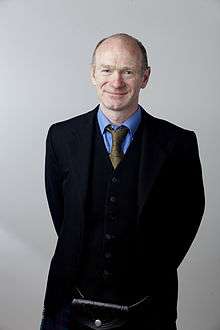Peter Keightley
| Peter Keightley | |
|---|---|
 Peter Keightley at the Royal Society admissions day in London, July 2014 | |
| Born | Peter D. Keightley |
| Alma mater | University of Edinburgh (PhD) |
| Awards | FRS (2014)[1] |
| Scientific career | |
| Fields | |
| Institutions | University of Edinburgh |
| Thesis | Studies of quantitative genetic variation (1989) |
| Doctoral advisor | William G. Hill |
| Website |
www |
Peter D. Keightley FRS[1] is Professor of Evolutionary Genetics at the Institute of Evolutionary Biology in School of Biological Sciences at the University of Edinburgh.[2][3]
Education
Keightley was educated at the University of Edinburgh where he was awarded a PhD in 1989 for research on genetic variation[4] supervised by William G. Hill.[4]
Research
Keightley leads a laboratory which works on evolutionary genetics and the evolutionary impact of new mutations on molecular genetic and quantitative trait variation and fitness. His research investitages genetic variation and adaptation through the analysis of nucleotide variation within natural populations and between different species.[5][6][7][8][9][10][11][12]
Keightley's research has been funded by the Biotechnology and Biological Sciences Research Council (BBSRC).[13]
Awards and honours
Keightley was elected a Fellow of the Royal Society in 2014. His nomination reads:
| “ | Peter Keightley is a leading evolutionary geneticist. He has made seminal contributions to the genetics and evolution of quantitative traits, and to molecular evolution and variation. His work combines theoretical modelling, genetic experimentation and bioinformatic studies of DNA sequences, in an unusually productive and innovative way. His work has shed light on several fundamental questions in genetics and evolution. He is especially well known for his work on the effects on fitness and rate of occurrence of spontaneous mutations. This has led to a much improved estimate of the deleterious mutation rate for the genome as a whole.[1] | ” |
Personal life
Keightley's uncle (Mike Keightley) was involved in the investigation of the Boston Strangler.
References
- 1 2 3 Anon (2014). "Professor Peter Keightley FRS". royalsociety.org. London: Royal Society.
- ↑ List of publications from Microsoft Academic
- ↑ Peter Keightley publications indexed by the Scopus bibliographic database. (subscription required)
- 1 2 Keightley, Peter (1988). Studies of quantitative genetic variation (PhD thesis). University of Edinburgh. hdl:1842/12340.

- ↑ Drosophila 12 Genomes, Consortium; Clark, A. G.; Eisen, M. B.; Smith, D. R.; Bergman, C. M.; Oliver, B; Markow, T. A.; Kaufman, T. C.; Kellis, M; Gelbart, W; Iyer, V. N.; Pollard, D. A.; Sackton, T. B.; Larracuente, A. M.; Singh, N. D.; Abad, J. P.; Abt, D. N.; Adryan, B; Aguade, M; Akashi, H; Anderson, W. W.; Aquadro, C. F.; Ardell, D. H.; Arguello, R; Artieri, C. G.; Barbash, D. A.; Barker, D; Barsanti, P; Batterham, P; et al. (2007). "Evolution of genes and genomes on the Drosophila phylogeny". Nature. 450 (7167): 203–18. doi:10.1038/nature06341. PMID 17994087.
- ↑ Barton, N. H.; Keightley, P. D. (2002). "Understanding quantitative genetic variation". Nature Reviews Genetics. 3 (1): 11–21. doi:10.1038/nrg700. PMID 11823787.
- ↑ Eyre-Walker, A.; Keightley, P. (Aug 2007). "The distribution of fitness effects of new mutations". Nature Reviews Genetics. 8 (8): 610–618. doi:10.1038/nrg2146. ISSN 1471-0056. PMID 17637733.
- ↑ Eyre-Walker, A; Keightley, P. D. (1999). "High genomic deleterious mutation rates in hominids". Nature. 397 (6717): 344–7. doi:10.1038/16915. PMID 9950425.
- ↑ Millar, C. B.; Guy, J; Sansom, O. J.; Selfridge, J; MacDougall, E; Hendrich, B; Keightley, P. D.; Bishop, S. M.; Clarke, A. R.; Bird, A (2002). "Enhanced CpG mutability and tumorigenesis in MBD4-deficient mice". Science. 297 (5580): 403–5. doi:10.1126/science.1073354. PMID 12130785.
- ↑ Haag-Liautard, C; Dorris, M; Maside, X; MacAskill, S; Halligan, D. L.; Houle, D; Charlesworth, B; Keightley, P. D. (2007). "Direct estimation of per nucleotide and genomic deleterious mutation rates in Drosophila". Nature. 445 (7123): 82–5. doi:10.1038/nature05388. PMID 17203060.
- ↑ Keightley, P. D. (1994). "The distribution of mutation effects on viability in Drosophila melanogaster". Genetics. 138 (4): 1315–22. PMC 1206267. PMID 7896110.
- ↑ "Interference among deleterious mutations favours sex and recombination in finite populations". Nature. 443 (7107): 89–92. 2006. doi:10.1038/nature05049. PMID 16957730.
- ↑ UK Government research grants awarded to Peter Keightley, via Research Councils UK